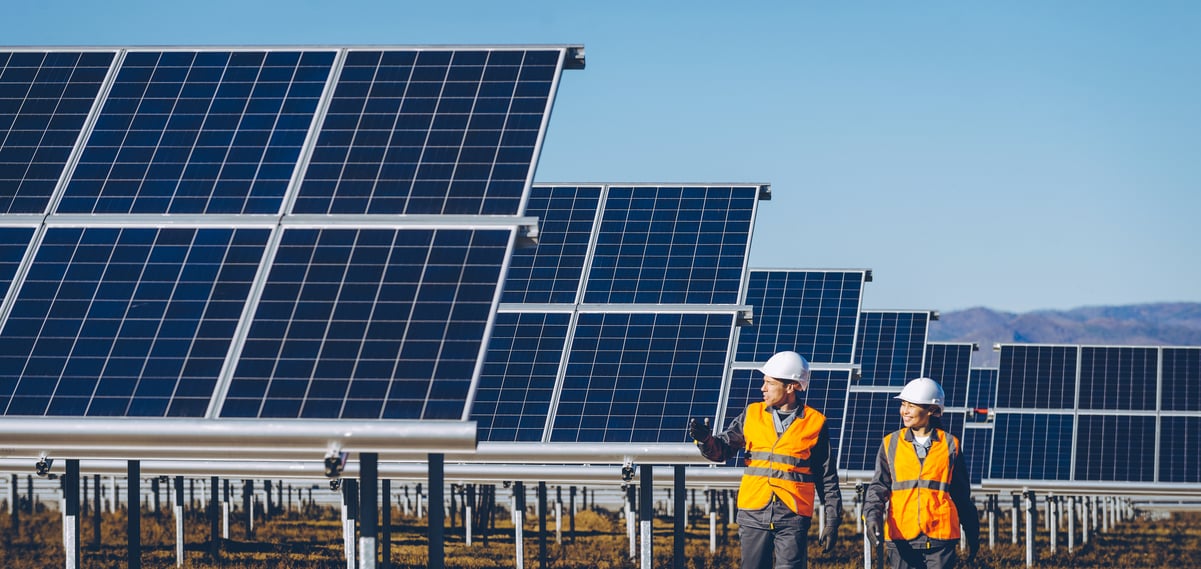The threat of tariffs on solar imports as a result of the Suniva/SolarWorld trade case may already be benefiting First Solar's (FSLR +0.50%) domestic business. Not only are solar module prices rising as developers stockpile what they need ahead of the final ruling, but First Solar is also able to provide long-term price guarantees because its thin-film modules probably won't be subjected to import tariffs at all. This gives First Solar the ability to win contracts in the U.S. well into 2018 without worrying about tariffs.
We're already seeing positive results because of First Solar's position outside the trade case. And if President Trump puts punitive tariffs on the solar industry, we'll probably see a windfall for First Solar in the future.

Image source: First Solar.
First Solar is already a winner in the trade case
At the trade-case hearing, SunPower (SPWR +0.00%) CEO Tom Werner gave a peek into what his company is seeing in the marketplace as a result of the threat of tariffs. In his prepared testimony, he said: "At SunPower, we're already feeling the effects of growing uncertainty. In the last few weeks, we lost a multi-hundred-million-dollar opportunity to First Solar -- who is not in this proceeding -- because we couldn't offer price certainty and they could."
So First Solar has won a multi-hundred-million-dollar contract in just the past few weeks, which should result in a nice increase in its backlog. And we know that silicon-based solar manufacturers, like SunPower, are having a hard time winning bids in the U.S. because they can't guarantee future prices for customers.
Capitalizing on an opportunity
First Solar's new stronger competitive position presents an opportunity management is trying to exploit. As the company upgrades equipment from Series 4 to the new Series 6 product, it's trying to maintain as much production capacity as possible. It's keeping production in Malaysia open longer than anticipated and installing new equipment in an unused plant in Vietnam instead. This will allow the company to make more solar modules in 2017 and 2018 than if the Malaysia plant were upgraded first. By the end of 2019, the company will have nearly 4 GW of capacity that could be made in, or shipped to, the U.S. to serve the solar market.
All of these moves are an effort to capitalize on an opportunity presented by potential solar tariffs. And by the look of it, First Solar's benefit could already be worth hundreds of millions of dollars in revenue.
SunPower's uncertain position in the U.S.
While First Solar is capitalizing, SunPower is clearly losing business already because of potential tariffs. The utility-scale market will be particularly difficult for the company because projects are extremely price sensitive and developers will want price guarantees. Even commercial and residential projects will probably see dampened demand if prices rise because of tariffs.
As one of the top U.S. solar developers and suppliers, SunPower's business could be affected more than most manufacturers if tariffs are imposed. It can turn overseas to sell product, but higher costs in the U.S. could be a big negative, and it looks as if we're already seeing the impact tariffs could have on SunPower.
The only winner if tariffs hit solar?
First Solar may be the only solar company -- aside from Suniva and SolarWorld -- to be quietly cheering for tariffs on silicon-based solar cells and modules. The company will probably be competing with much more expensive silicon modules, which could result in strong demand and margins for First Solar's thin-film modules. By the look of it, the company is already capitalizing on its unique position in the market.






